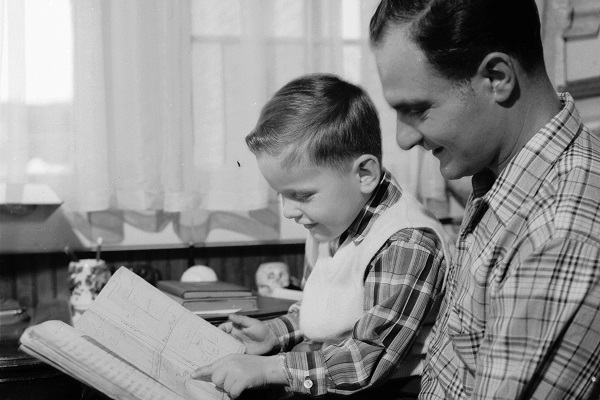I spent the weekend in Dublin; consequently, I am suffering from what Apthorpe would have called ‘Bechuana tummy’. For the uninitiated, Apthorpe is the premier fool in Men at Arms, the first book in Evelyn Waugh’s Sword of Honour trilogy. I was reading it in bed last night and was wryly amused by this joke, which hangs over two chapters:
‘The two lame men climbed into the car and returned to Kut-al-Amara in alcoholic gloom.
Chapter 7
Next day Apthorpe had a touch of Bechuana tummy, but he rose none the less.’
I return to Men at Arms often, but never without reason. I did so this time because Father’s Day fell yesterday. My father is of a generation and I am of a temperament: we don’t do Father’s Day. This is not an edict, but an unspoken agreement between blood relatives. If asked to explain ourselves, we might say that Father’s Day is a commercial nonsense, like Valentine’s Day or some such. Yet it’s strange the way that commercial nonsense works its way into the mind.
My copy of Men at Arms is really my father’s. He lent it to me when I was 15, saying that I might enjoy it. I did, very much, and never returned it. It’s like its rightful owner: slightly discoloured but soldiering on. It is a Penguin paperback, priced at 6d. The front cover carries the unmistakeable work of Quentin Blake: depicting the hero, Guy Crouchback, and another of the fools, Brigadier Richie-Hook. The spine is wearing and the covers’ edges have frayed; but this worthless paperback has been treated with such care by two regular readers that not one page is lost or torn.
On my way to work this morning, I read an entertaining piece by Lynne Truss in which she said that nothing good ever comes of “borrowing” or “lending” books. Up to a point, Ms Truss. My bookshelves are full of “borrowed” books. Mrs Hansley’s copy of All Quiet on the Western Front (“borrowed” aged 12), Mrs Whitehead’s copy of Goodbye to All That (“borrowed” aged 13), my uncle’s copy of I Claudius (“borrowed” aged 15), Mr Harding’s copy of The Lyrical Ballads (“borrowed” aged 16), and my mother’s copy of Tender is the Night (“borrowed” aged 19) are standing the test of time, having survived a recent house move that claimed my own editions of those books.
I have an Everyman omnibus of Sword of Honour, but I recalled the old favourite after a brief chat on the blower with the Old Man. He didn’t mention ‘Bechuana tummy’, but the jaunty lilt in his voice betrayed that he was thinking it. I opened the front cover and there, as ever, was his undated signature. A lone signature in a paperback implies communal living. This suggests that the only child of my grandparents took this book to school in the 1950s or, at the very latest, university in the early ’60s. I don’t remember signing any of my books when I undertook that journey forty years on. The décor in the institutions we attended may have survived the intervening years, but little else had. Do our respective actions tell something of the fortunes of the book as a source of adolescent entertainment? Or does it reveal something about those who grew up in an age of scarcity and those who matured in an age of plenty?
Family history invariably relates to the future. Will my son sign his iWhatnot twenty years from now? And, when he has a touch of ‘Bechuana tummy’, will he turn to the gizmo or the copy of whatever it was that he “borrowed” from me?






Comments